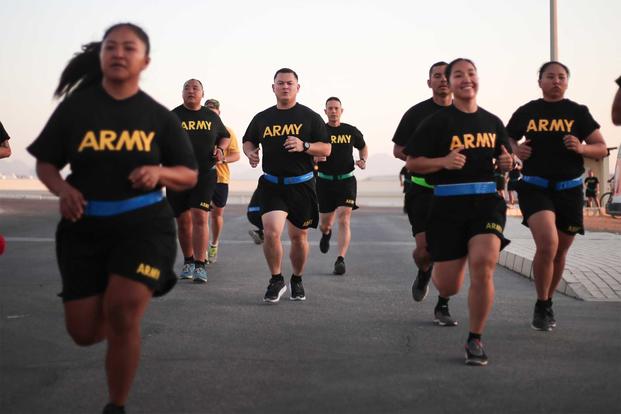The Army general in charge of the service's new combat fitness test said he's confident it will remain gender-neutral, despite reports of female soldiers failing at much higher rates than men.
The popular Facebook page U.S Army W.T.F! Moments recently posted what appeared to be a set of leaked slides showing that about 84% of women failed the Army Combat Fitness Test, compared with 30% of men.
Army officials from the Center for Initial Military Training said the slides are not official documents.
Maj. Gen. Lonnie Hibbard, the center's commander, spoke to the issue Tuesday at the 2019 Association of the United States Army's annual meeting.
Related: Army to Adjust Standards for New Combat Fitness Test This Fall
"I saw the articles, and especially if you look at some of the blogs, it talked about the failure rates, and we are seeing a difference in failure rates," Hibbard told reporters at a press conference. "We have to learn how to train for this test."
The ACFT is set to replace the current Army Physical Fitness Test for all soldiers beginning in October 2020. For the last 35 years, soldiers have trained to the current physical fitness test, which focuses on muscular and cardio endurance, Hibbard said.
"As we look at the new Army Combat Fitness Test, it is more of a functional fitness test," he said. "And we have to change the way we do [physical training]."
The leaked slides allegedly show test results of 11 battalions, which include 2,849 men and 357 women.
Master Sgt. Shelley Horner, the noncommissioned officer in charge of the ACFT Mobile Training Team, said some of the scores seen during the year-long field test, which wrapped up at the end of September, were the result of soldiers taking the new six-event test for the first time.
"Many of them [were] performing the events themselves for the first time, so the scores we have seen were a result of their current fitness level experience with those events," she told reporters.
"What we noticed throughout the rest of fiscal year 2019, and so far into 2020, is as soldiers become more familiar with the events, and the requirements of the events, they are changing the way that they train and they are improving their scores overall."
Horner said she struggled with events such as the leg tuck when she first attempted the new combat fitness test.
"I incorporated more strength training ... and I have increased in every event," she said. "And now I am able to do 12 leg tucks, so from zero to 12 leg tucks is a huge win for me."
Hibbard said he is confident that the "Army will adapt," adding that it's not much different than taking the college-entry Scholastic Aptitude Test, or SAT, for the first time.
"You go in the first time, some people do very well on all categories. And some people don't do well in math and realize they have got to go study," he said.
"When we first started doing it, nobody could pass the test; now we've got four people that ... can max the test because units are changing the way they are doing the [physical readiness training] and focusing on functional fitness."
-- Matthew Cox can be reached at matthew.cox@military.com.
Read more: Air Force 'Testing Buy-In' on Gender-Neutral Fitness Test Overhaul












